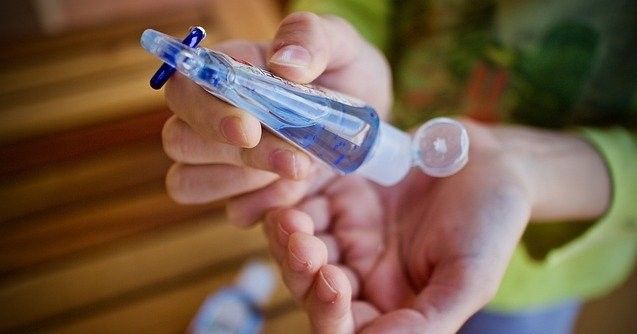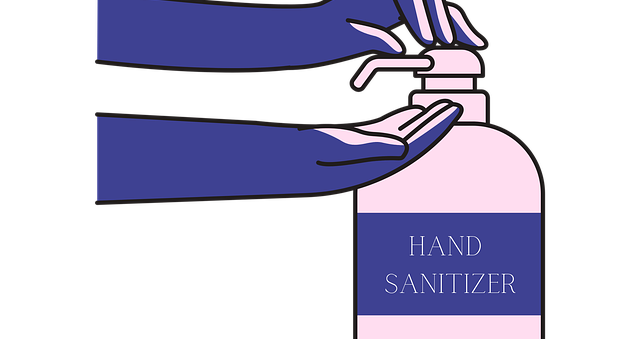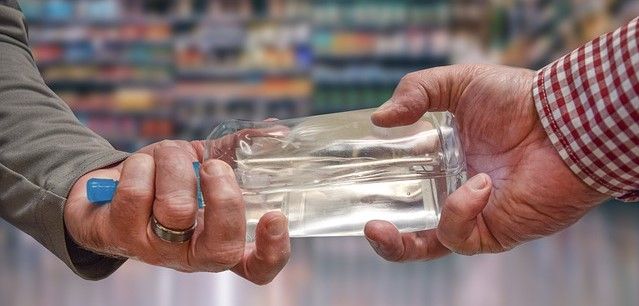Hand sanitiser does get old and will lose its effectiveness over time.
However, in most countries hand sanitiser does not need to have an expiration date on the bottle. Instead, the expiry date shown is placed there by the manufacturer as a guarantee that the product will work with 100% efficiency up to that date.
After that time, things become less certain.

Hand sanitizers fall into two broad groups, those based on alcohol and those without alcohol.
“Alcohol-based sanitizers contain either ethanol or isopropyl as the primary active ingredient,” explains the online health journal Medical News Today. “Non-alcohol-based hand sanitizers contain the antiseptic benzalkonium chloride. Both types also contain water, along with glycerol or other humectants to help prevent skin dryness.”
Crucially, alcohol-free hand sanitisers have not been proven effective against the coronavirus.
For this reason, most hand sanitisers on the market in 2020 contain alcohol.
But logically, if alcohol is a preservative, can hand sanitiser expire? Like a bottle of Drambuie at the back of the drinks’ cabinet, doesn’t hand sanitiser almost live forever?
Answering this question largely depends on the container the sanitiser is stored in.
“Alcohol evaporates when exposed to the air. Hand sanitizer containers are not air-tight, so some alcohol evaporation can occur after removing the seal,” notes the journal. “As a result, the alcohol concentration of alcohol-based hand sanitizer slowly decreases over time, reducing the antiseptic properties of the product.”

To be strong enough to kill viruses and bacteria, a hand sanitiser must contain at least 60% alcohol by volume. Below this level, the sanitiser will destroy most pathogens, but some will survive, and multiply sufficiently to make you or someone in your family sick.
As a rule of thumb, most hand sanitisers last for a few years before they begin to lose their potency. So even if your bottle has no date on it, assume it’s good for 18 months from the date of purchase and you should be safe.
Much of the problem of stating clearly whether an old hand sanitiser is effective or not, is that not all hand sanitisers are made to the same standard.
A 2018 review looked at the differences between the ingredients included in various hand sanitisers finding that, those with ethanol concentrations of 42.6% or more were effective against a whole host of bacteria and viruses, including SARS, types of Ebola, the Zika virus, the Middle East respiratory syndrome (MERS), herpes simplex viruses 1 and 2, and influenza A and B.
However, those using ethanol with concentrations of only 40% were not effective against the hepatitis C virus, whereas those with concentrations of 73.6% were.
For killing coronavirus, Dr Richard Watkins, an expert on infectious diseases, states that, “… a hand sanitizer that contains at least 60% alcohol is the best alternative [to hand washing]”.
It is also important to keep them in airtight containers, to prevent the strength of your product diminishing. Additionally, “Hand sanitizer should be stored out of reach, and sight, of children,” notes the US Food and Drug Administration. Adding that, “It should not be stored above 105°F (for example, it should not be stored in a car during the summer months).”
But as a rule, when it comes to your health, especially during these unusual times, it is best to play it safe; it is best not to keep sanitiser products stored for long times.

Why use a health product that might not being doing its job? Would you jump out of an aeroplane with a very old parachute or would you prefer one that has been freshly packed?
You should base the same thinking around your hand sanitiser products, because when it comes to your health and the health of your family, why take a chance?
To learn more about hand sanitiser and how to keep your family healthy take a look at more articles like this on the AG CHEMI GROUP blog page.
To refresh your supplies of hand sanitiser look at the range of products available at AG PROTECT.
Photo credit: Clker-Free-Vector-Images from Pixabay, Eduardo RS from Pixabay, Harvey Boyd from Pixabay, Luisella Planeta, & Lena Helfinger